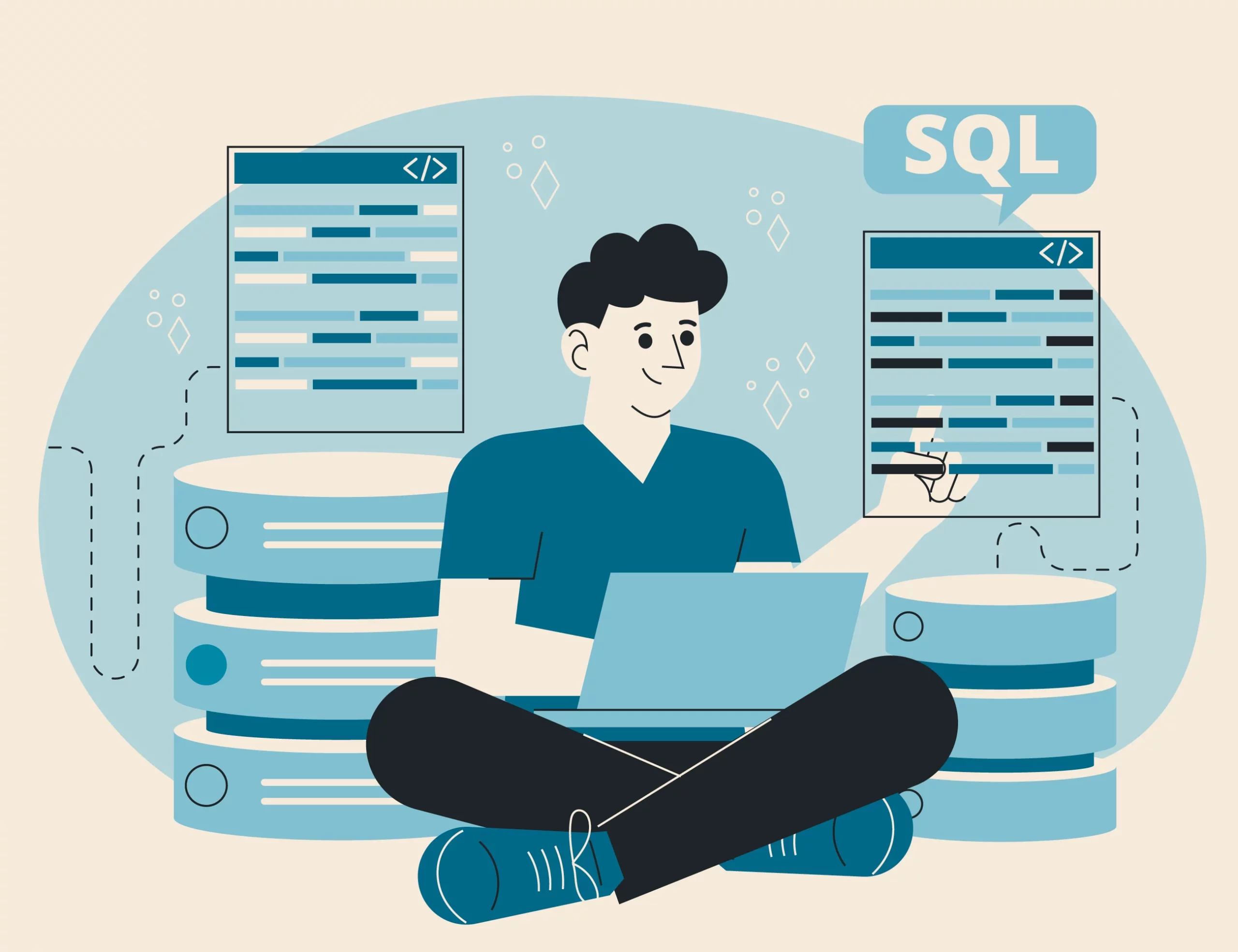Are you looking for SQL professionals to join your company? Asking the right SQL interview questions can help you identify candidates with the right skills to manage and analyze your organization’s data.
Matching your questions with the particular skillset your open positions require makes the recruitment process more targeted and avoids wasting resources.
Formulating scenario-based and skill-specific questions for SQL interviews can also help you:
- Assess a candidate’s true technical skills
- Uncover embellished resumes
- Evaluate a candidate’s problem-solving and critical thinking
- Test how they work under pressure
More importantly, well-structured SQL interview questions can reduce hiring bias. These questions focus on skills and experience to identify qualified candidates who might otherwise be overlooked based on resumes alone.
SQL interview questions for beginner
Below is a list of SQL interview questions you can ask candidates applying for roles in which basic SQL skills can be valuable, such as business and data analysts or QA testers.
They are classified according to the aspects of SQL they measure, ranging from basic definitions and concepts to more advanced data handling and database management topics.
We’ve also provided some SQL query interview questions.
Basic concepts and definitions
- What is SQL?
- What are SQL dialects? Give some examples.
- What is a database?
- What is DBMS? What DBMS types are you familiar with?
- What is RDBMS? Give some examples of RDBMS.
- What are tables and fields in SQL?
- What is a schema?
- What are entities? Give some examples.
- What are relationships? Give some examples.
- What is a NULL value, and how does it differ from zero or a blank space?
SQL operations and commands
- What is an SQL statement? Give some examples.
- What types of SQL command types do you know? Provide some examples for each type.
- How do you create a table?
- How do you update a table?
- How do you delete a table from a database?
- How do you get the count of records in a table?
- How do you select all columns from a table?
- How do you select common records from two tables?
Querying and data manipulation
- What is an SQL query, and what are the different types of SQL queries?
- What is a subquery in SQL?
- What are the different types of SQL subqueries?
- What is a join in SQL?
- What are the different types of joins available in SQL?
- What are some common clauses or statements used with the SELECT query in SQL?
- What is the DISTINCT statement in SQL, and how is it used?
Applications and utilities of SQL
- What are the main applications of SQL?
SQL structure and syntax enhancements
- What is a constraint? Why use them?
- What SQL constraints do you know?
- What is a primary key?
- What is a unique key?
- What is a foreign key?
- What is an index?
- What types of indexes do you know?
- What is an SQL comment?
- What is an SQL operator?
- What types of SQL operators do you know?
- What is an alias?
- What is a clause?
Intermediate SQL interview questions
Here is a list of SQL interview questions that are suitable for candidates applying for positions that require intermediate SQL skills, such as SQL developers.
These job roles need to write and maintain complex SQL queries to extract, transform, and load data <ETL> for data warehouses and other analytical systems and may also be involved in database design and optimization.
The SQL interview questions below will help reveal if they have a strong understanding of database structures and how to write efficient SQL queries.
SQL functions
- What are functions in SQL, and why do you use them?
- What SQL function types are you familiar with?
- What aggregate functions do you know?
- What scalar functions do you know?
- What are case manipulation functions? Give some examples.
- What are character manipulation functions? Give some examples.
- What is the CASE<> function?
SQL commands and syntax
- What is the difference between local and global variables?
- When you use the ORDER BY statement, how are the results ordered by default, and how can you specify a different order for sorting the data?
- What set operators do you know?
- What operator is used in the query for pattern matching?
- In a SELECT query, what’s the specific order in which the clauses are executed?
- In which order does the interpreter execute the common statements in the SELECT query?
- What is the difference between giving an alias to a column and renaming it?
- What is the difference between nested and correlated subqueries?
- How are the TRUNCATE and DELETE statements different?
- How are the TRUNCATE and DROP statements different?
- How are the WHERE and HAVING statements different?
Data design and optimization
- What is normalization in SQL, and why use it?
- What is denormalization in SQL, and why use it?
- What is the difference between clustered and non-clustered indexes?
SQL relationships and constraints
- What is the difference between a primary key and a unique key?
- What is a composite primary key?
- What SQL relationship types are you familiar with?
- What possible values can you store in a BOOLEAN data field?
Views and virtual structures
- What is a view, and why use it?
- Can we create a view based on another view?
- What happens to a view if the underlying table it’s based on is deleted?
Practical SQL operations
- How do you add a record/delete a record to/from a table?
- How do you add/rename/delete a column to/from a table?
- How do you select all even or all odd records in a table?
- How do you prevent duplicate records when making a query?
- How do you insert many rows into a table?
- How do you find the nth highest value in a column of a table?
- How do you find the values in a text column of a table that start with a certain letter?
- How do you find the last ID in a table?
- How do you select random rows from a table?
Advanced SQL Interview Questions
When interviewing for positions requiring advanced SQL skills — such as data architect and data scientist positions — you need to determine if a candidate understands how to manage and manipulate massive datasets and architect complex database systems. Here are some examples of SQL interview questions for this category:
Database properties and theories
- What is the difference between ACID and BASE properties in the context of databases?
- Explain the concept of sharding in the context of database management.
- Discuss the pros and cons of using NoSQL databases compared to traditional relational databases.
- Discuss the role of database normalization and denormalization in database design.
Database performance and optimization
- How does a database index impact query performance? Explain different types of indexes and their use cases.
- Explain the concept of query optimization and the techniques used for optimizing SQL queries.
- How does the SQL execution engine process a query? Explain the query execution plan.
- How does the SQL Server query optimizer work, and how can you influence its behavior?
- Discuss the role of indexing in improving query performance.
- How do you handle slow-performing queries, and what tools or techniques do you use for SQL performance tuning?
SQL features and operations
- Can you explain the key differences between materialized views and regular views?
- What are CTEs <Common Table Expressions>, and when would you use them?
- Explain the differences between stored procedures and functions in SQL.
- What is the purpose of the EXPLAIN statement in SQL, and how is it used for query analysis?
- What is the purpose of the GROUP BY ROLLUP and GROUP BY CUBE operators in SQL?
Database transactions and security
- Discuss the significance of database transactions and isolation levels.
- Explain the concept of database locking and different types of locks.
- Database Structure and Management
- What is database partitioning? What are its benefits?
- What is database replication? What are its use cases?
- Discuss the challenges and solutions for handling large datasets in SQL databases.
These questions should help you assess an applicant’s problem-solving and critical thinking skills — both of which are important for SQL roles, from beginner to advanced.
Of course, depending on the candidate’s response, you can add questions to explore further or clarify points.
Your goal should be to measure their capacity for innovative thinking, which separates an average candidate from an exceptional hire.




